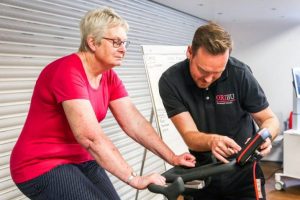This week, the UK government announced a £2 billion package to encourage people to choose alternatives to public transport when travelling, making healthier habits easier and relieving the pressure on public transport.
The package includes a voucher scheme to help get bikes fixed and back on the roads, creating higher standards for permanent cycling infrastructure, and encouraging GPs to prescribe cycling and exercise. It comes following research from Public Health England that found excess weight can increase risk of serious illness and death from Covid-19.
At ORI, we have been prescribing cycling for hip osteoarthritis for over seven years, with many patients benefiting from making long-term lifestyle change and incorporating cycling into their daily routine.
The CHAIN programme, conceived by Professor Robert Middleton and Associate Professor Thomas Wainwright, aims to promote the self-management of osteoarthritic symptoms through an intervention of cycling and education, delivered at a local leisure centre. In addition to benefits related to weight loss, our research has shown that cycling can help improve pain, function and quality of life in adults with hip osteoarthritis and other forms of hip pain. Furthermore, our findings have shown that even those with complex comorbidities can exercise at higher levels than many health professionals may think, as long as they are assessed and supervised appropriately.
We recently completed a follow-up study on patients who completed the CHAIN programme five years ago, and found that all participants were still engaging with physical activity on a regular basis. 57% had not pursued total hip replacement surgery, the treatment for end-stage hip osteoarthritis.
We found that for many patients, learning that it was safe and beneficial for them to cycle was a significant motivator in their decision to incorporate exercise into their lifestyle long-term. Hence, the government scheme to encourage GPs to prescribe cycling is well-placed and may provide reassurance to many who otherwise would not consider cycling.
Further research on the CHAIN programme can be found here.





